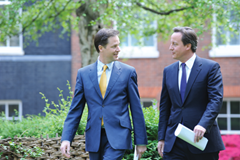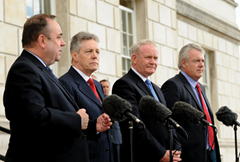Coalition: one year on
 agendaNi reviews the Coalition Government’s first year in power and its impact on Northern Ireland. Westminster’s decisions on finance, security and the constitution have important local consequences.
agendaNi reviews the Coalition Government’s first year in power and its impact on Northern Ireland. Westminster’s decisions on finance, security and the constitution have important local consequences.
“We’re all in this together,” David Cameron affirmed as he visited Stormont last May. Yet one year on, as austerity starts to bite and the devolved nations dissent, Northern Ireland and Westminster seem further apart now than before the general election.
This is partly because 2010-2011 has also been the first year of ‘full devolution’ in almost 40 years so Westminster’s say on most social and economic policy is limited. However, this direct influence is outweighed by the block grant funding 93 per cent of our budget.
Ulster Unionists had hoped that they, and not the Liberal Democrats, would be forming a coalition government. The UCUNF project delivered 102,361 votes but no MPs, ending a century of UUP MPs in the Commons.
All 13 sitting Northern Ireland MPs voted against plans to raise English university fees in December; the policy was passed by 323 votes to 302. In the Commons’ most serious decision to date, the House divided 557-13 to approve military action against Libya. The DUP and Alliance were in favour but the SDLP objected.
Cameron & Clegg
As Leader of the Opposition, David Cameron visited Northern Ireland for the UUP conference on 6 December 2008 and to campaign on 4 May 2010, returning as Prime Minister 16 days later.
On the 4 May visit, agendaNi asked Cameron how often he planned to visit Stormont but he said that would be “very much a matter for them” i.e. the MLAs.
The Coalition Agreement re-iterates his desire to “work to bring Northern Ireland back into the mainstream of UK politics”. Conservative sources insist that his interest is sincere and Owen Paterson has recalled how he read his reports on the province “in great detail” when in opposition. He also made private visits, including a walk in the Glens of Antrim.
In government, Cameron’s closest link to Northern Ireland has been his apology for Bloody Sunday, relayed live to Derry’s Guildhall Square on 15 June, when he stated that he was “deeply sorry” on behalf of the Government and the country.
Nick Clegg made a two-day visit to the province in October 2010. Meeting students and staff at Queen’s University, he said he was conscious that the economy here is very dependent on the public sector and that it is time “to try and create a Northern Ireland economy which is more diverse.”
He also met with Robinson and McGuinness, who pressed him on spending cuts. Speaking of the deficit reduction plans, Clegg said: “I am acutely aware that what we’re doing is controversial and is difficult.”
Paterson
Owen Paterson had extensive previous experience of the province from his time as Shadow Northern Ireland Secretary, and has been much more visible and energetic than Shaun Woodward.
In an interview with agendaNi last summer, Paterson said he wanted to see devolution settle down and the private sector grow, but said Northern Ireland must be part of the “team effort” to cut the deficit.
Paterson has set down ground rules for the First and deputy First Ministers who, to their dismay, must approach him as the main contact point for Westminster rather than going directly to Cameron. The Tories have a free rein in the Northern Ireland Office, with no Liberal Democrats to consult; Hugo Swire has a low-key support role as Minister of State.
 Among unionists, Paterson sparked controversy in February when he commented that if Sinn Féin’s Martin McGuinness was First Minister, it would be “an extraordinary endorsement” of progress.
Among unionists, Paterson sparked controversy in February when he commented that if Sinn Féin’s Martin McGuinness was First Minister, it would be “an extraordinary endorsement” of progress.
As Shadow Northern Ireland Secretary, Paterson was heavily involved in UCUNF but relations with the UUP have since cooled. The Ulster Unionists now follow a more traditionalist course, although future UUP MPs may take the Tories whip.
In return, the Conservatives did not contest the Assembly poll (unlike Scotland and Wales) and put up eight council candidates who gained 1,321 votes. In a break with tradition, Owen Paterson supported their campaign but none were successful. However, Northern Ireland voted no to AV, with 56.3 per cent against.
Finance
Northern Ireland is the region of the UK most reliant on state spending. The Spending Review announced that resource funding was to be reduced by 6.9 per cent and capital funding by 37 per cent over four years. However, the Executive claims that the cuts amount to 8 per cent and 40.1 per cent respectively.
The Secretary of State promised to honour the £18 billion infrastructure investment programme promised by Labour under the St Andrews Agreement and says this can be delivered on the same timescale, by 2018. Peter Robinson and Martin McGuinness claimed this has been disregarded but Paterson commented that Northern Ireland had got a “good deal”.
£200 million will also be released to compensate Presbyterian Mutual Society members.
The campaign to reduce Northern Ireland’s corporation tax rate also moved forward, with the main political parties welcoming a consultation paper from the Treasury in March. It outlined the implications of devolving that power but Paterson warned that the reduction is “not in the bag”. The consultation runs until 24 June.
In 2009-2010, £4.2 billion was spent locally on social security benefits. Work and Pensions Secretary Iain Duncan Smith said that planned welfare cuts represent a “huge step forward” and will ensure that work is at the “heart of the welfare system”.
Alex Attwood warned, though, that the Westminster cuts could “lock an economy into high unemployment and low growth”. He argued that to propose cuts to welfare payments while disregarding Northern Ireland’s high level of deprivation “is folly”.
However, the plans were welcomed by then Employment Minister Danny Kennedy. “We need to get serious about addressing the economic and social impact of long-term unemployment and inter-generational worklessness,” he remarked.
Security
Ministers and officials have closely followed the rising threat from Irish terrorism, now described as “severe” in Northern Ireland and “substantial” in Great Britain. MI5 has been responsible for national security since October 2007 but has accepted that its initial assessment was wrong.
In 2010, there were 81 terrorist-related shootings and 91 bombings in the province. In response, the PSNI arrested 210 suspects and charged 49 of them with terrorist offences.
The most serious attack came on 2 April 2011, when Constable Ronan Kerr was murdered in Omagh. Cameron took a calmer approach than Gordon Brown who flew to Northern Ireland after the Massareene Barracks attacks. The PM issued his condemnation in London and Owen Paterson flew back to oversee the response.
Paterson has also secured an extra £199.5 million for the PSNI’s anti- terrorism work up to 2015, backed up by £45 million from the Northern Ireland Executive. Dissidents intend to attack targets in Great Britain but have not been successful.
The way ahead
David Cameron set out three aims on the night he took office: an economy that “rewards work”, a society with “stronger families and stronger communities” and a political system “that people can trust and look up to once again.”
Economic recovery will be the litmus test for the coalition over the next four years and there is more financial pain to come. UK-wide growth was 0.5 per cent in 2011’s first quarter. Inflation is expected to reach 5 per cent this year.
The coalition claims its approach is “tough but fair” while Labour retorts that it’s “hurting but not working”. Other parties, including all local MPs, will continue to oppose the deficit reduction’s direction and speed but the Government is sticking adamantly to the Spending Review.
Public uproar and Lib Dem pressure could force changes. That said, the Government was not deterred by the tuition fee protests and the Conservatives’ influence far outweighs the minor party.
The union itself will be tested by Scotland’s referendum but, short of independence, Alex Salmond wants more autonomy in Edinburgh, including over corporation tax. The UK enters this unpredictable phase as a ‘disunited kingdom’ with different parties in government in each nation.
Central government cuts and growing regional calls for separatism may result in a very different UK, politically and in everyday life, when this Parliament is complete.
Achievements
agendaNi asked Northern Ireland’s representatives in Westminster for their main achievements during the last year.
DUP
• Ensuring that the Coalition Government “stuck with” the proposals agreed with Labour to refund Presbyterian Mutual Society members
• Opposition day motion calling for the Government to put the military covenant on a statutory footing
• Nigel Dodds’ Support and Protection for Elderly People and Adults at Risk of Abuse Bill
SDLP
• Mark Durkan’s speech on the Saville inquiry and David Cameron’s Bloody Sunday apology
• Dedicated fisheries debate in Westminster
• Westminster Hall debate on Ballymurphy
Alliance
• Called for transparency in party political donations and an end to dual mandates
• Pressed the Chancellor to ensure that new banking regulations are effective in Northern Ireland
• Made the case for fairer reform of welfare and pensions
Sylvia Hermon
• Campaigning to save Northern Ireland’s last remaining Coastguard centre in Bangor
Sinn Féin emphasised its abstentionist policy and claimed that none of the sitting MPs make any impact within the chamber.
The UUP, which has five peers, declined to respond.





